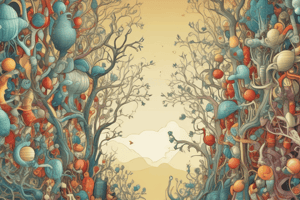Podcast
Questions and Answers
What is ecology primarily concerned with?
What is ecology primarily concerned with?
- The application of biology in medicine
- The functions of the human body
- The relationships between organisms and their environment (correct)
- The study of genetics
How does genetics contribute to shaping an organism's traits?
How does genetics contribute to shaping an organism's traits?
- By studying only the human genome
- Through the intricate interplay with the environment (correct)
- By solely focusing on gene therapy
- By working independently of the environment
What major breakthroughs have come from biomedical research?
What major breakthroughs have come from biomedical research?
- Development of antibiotics (correct)
- Advancements in CRISPR technology
- Discovery of new plant species
- Understanding gene therapy
Which field has seen the application of biology in developing antibiotics?
Which field has seen the application of biology in developing antibiotics?
What do the advancements in gene editing techniques like CRISPR promise?
What do the advancements in gene editing techniques like CRISPR promise?
What is the main focus of modern biology according to the text?
What is the main focus of modern biology according to the text?
What is the fundamental unit of life in biology?
What is the fundamental unit of life in biology?
Which theory provided scientists with a clear understanding of the cell's structure and function?
Which theory provided scientists with a clear understanding of the cell's structure and function?
What classification system allows us to organize and understand relationships among Earth's species?
What classification system allows us to organize and understand relationships among Earth's species?
Which process has led to the incredible biodiversity seen on Earth today?
Which process has led to the incredible biodiversity seen on Earth today?
What is the cornerstone of modern biology that focuses on inheritance and variation?
What is the cornerstone of modern biology that focuses on inheritance and variation?
Which discovery revolutionized our understanding of life's processes?
Which discovery revolutionized our understanding of life's processes?
Flashcards are hidden until you start studying
Study Notes
Exploring the Wonders of Science: A Focus on Biology
Biology is a fascinating and essential branch of science that encompasses the study of living organisms. From the tiniest microbes to the complexities of human life, biology seeks to reveal the inner workings of life at all levels, providing a holistic perspective on the natural world.
Cellular Life: The Building Blocks of Life
At the heart of biology lies the cell, the fundamental unit of life. Discoveries such as the cell theory, formulated in the 19th century, gave scientists a clear understanding of the cell's structure and function. Cells can be found in all living organisms and consist of various organelles, each with specific roles, from energy production to waste removal.
The Tree of Life: Classification and Evolution
Biology's classification systems, such as the Linnaean taxonomy, allow us to organize and understand the relationships among the countless species on Earth. These classifications help us trace the evolutionary history of life. Through processes like natural selection and genetic mutation, life has diversified and adapted, leading to the incredible biodiversity we see today.
Genetics: The Language of Life
Genetics is a cornerstone of modern biology, focusing on the study of the molecular basis of inheritance and variation. The discovery of DNA's double-helix structure and its role as the genetic material revolutionized our understanding of life's processes. Genetics also helps us appreciate the intricate interplay between genes and environment in shaping an organism's traits and development.
Ecology: The Interrelationships of Organisms
Ecology is the study of the relationships between organisms and their environment. This branch of biology emphasizes the interdependence of living things, from the interactions between species (symbiotic, predator-prey, and competitive) to the complex ecosystems in which they occur. Ecological studies can help us understand and protect Earth's natural systems, maintaining a balance between environmental health and human development.
Medicine and Health: The Application of Biology
Biology's practical applications can be seen in fields such as medicine and health, where understanding the human body's structure and function is crucial. Biomedical research has led to numerous breakthroughs, from antibiotics to gene therapy, and continues to provide new insights into the causes, prevention, and treatment of diseases.
The Future of Biology: Innovation and Discovery
The field of biology is ever-evolving, with new discoveries and technologies continually pushing the boundaries of what we know. From the sequencing of the human genome to gene editing techniques like CRISPR, modern biology presents exciting opportunities for innovation and discovery. These advancements promise to improve our understanding of life, address global challenges, and shape a more sustainable future.
Biology's diverse subtopics offer a rich and engaging lens through which to explore the natural world, providing a unique perspective on the complexity of life. Whether you're a curious learner, an aspiring scientist, or simply someone eager to understand more about the world around you, the wonders of biology await discovery.
Studying That Suits You
Use AI to generate personalized quizzes and flashcards to suit your learning preferences.




